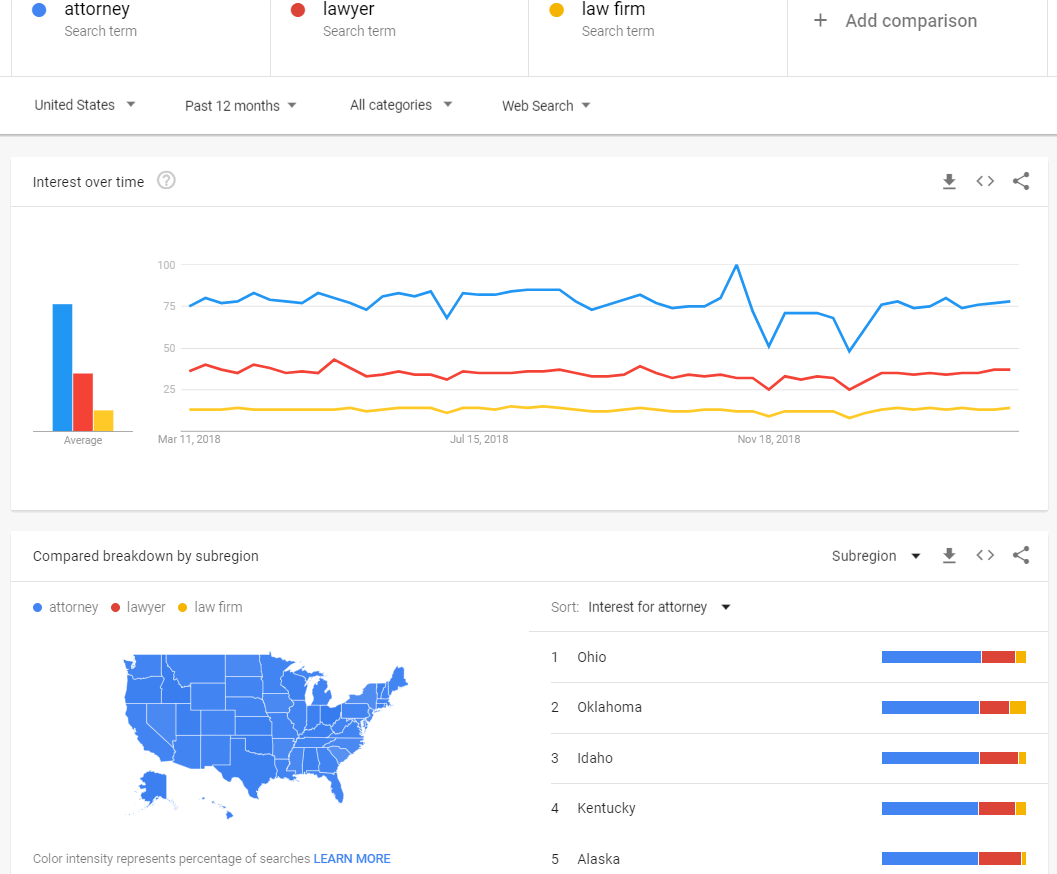What Keyword Do I Use? Attorney, Lawyer or Law Firm

Legal SEO & Keyword Research
When performing keyword research for your legal SEO campaign, one of the simplest but actually complex questions may be, what keyword do I use, attorney, lawyer or law firm. You can just pick one and trust that Google and other search engines are smart enough in their algorithms, as they say, to recognize the synonyms as equal. This could accomplish your keyword ranking or content strategy goal, but for others it is not enough, or they want a more definitive answer. That answer of course depends on the geography you are in and the area of practice you serve. Let’s look into some of the data around the keywords attorney, lawyer and law firm.
Google Adwords Keyword Data
Commonly in SEO, the first step in a dilemma like this would be to go to Google Adwords Keyword Planner and enter the terms you are investigating. Google Adwords will spit out the answers in the form of clicks, search traffic and competition. This gives you a first clue as to what terms are searched more and what the competition is for advertisers bidding on these terms. In the data set below is a sample set of attorney, lawyer and law firm keywords, some with generic areas of practice, some including Los Angeles and New York City (large example cities).
Looking at some of the trends shown in the report below, attorney terms seem to be more popular that their counterparts, but not in all cases. For the generic personal injury national term (no city), “personal injury lawyer” seems to lead with 1,007 clicks, this is estimated click data not accurate numbers. When looking at the Los Angeles personal injury terms, it is “Los Angeles personal injury attorney” slightly in the lead. “Criminal defense law firm” falls way below “criminal defense attorney” and “criminal defense lawyer”, here is an instant clue as to what you should be targeting if you were, for example, a national criminal defense law firm looking to optimize content. You can draw many clues from the small data set below that now begin to answer your question, what keyword should I use, attorney, law or law firm. In the end it will require research using keyword phrases specifically around your geography and area of practice, testing out different variations of attorney, lawyer and law firm.

Google Trends Keyword Data
Another fairly new source of data when looking into keyword popularity is Google Trends. This is a great, simple tool that compares up to 5 search phrases at once. For the example below I have entered 3, “attorney”, “lawyer” and “law firm” but this is another tool where you can do endless research and vary the terms to come up with different results. This graphs shows us some interesting trends just from these 3 phrases alone, and almost confirms some of what we saw in the Google Adwords data. The blue line, “attorney”, is searched way more than “law firm”, and even significantly more than “lawyer”. This is more information you can add to your arsenal for the ultimate decision of what keyword to use. It can apply to any keyword research across any industry, not just legal marketing.

Decide On The Target Keywords & Stick To It
Although these are two powerful tools and you are more informed on your journey to picking keywords, we have only scratched the surface. There are many other intricate tools for keyword research and infinite data sets you can run to come up with more definitive answers. There are also long tail keywords which we did not discuss, the trends that may apply to simple attorney, lawyer and law firm terms may not apply to long tail keyword terms, questions, informative searches, etc. The process however remains the same, whatever process you come up with. As long as you are confident with your keyword research process and see results from your content strategy, you are winning. The key is consistency, whatever set of keywords and phrases you target must be applied across your entire content strategy (website, social media channels, local channels, etc).
Expert Law Firms
- Atlanta Employment Law Attorney
- Florida Employment Lawyer
- New Jersey Employment Lawyers
- West Palm Beach Employment Attorneys
- California Sexual Harassment & Discrimination Lawyer
- Atlanta Medical Malpractice Attorney
- Knoxville Medical Malpractice Attorney
- Philadelphia Medical Malpractice Lawyer
- Houston Personal Injury Attorney
